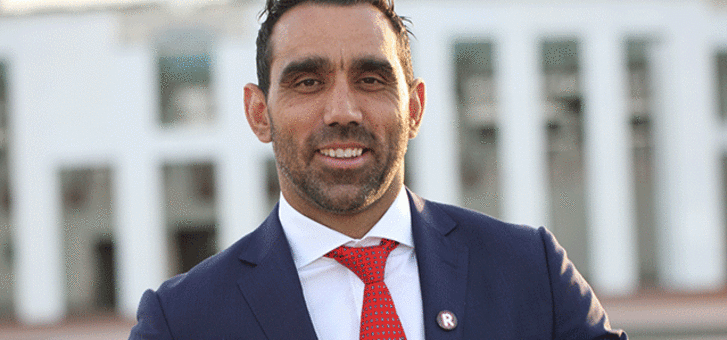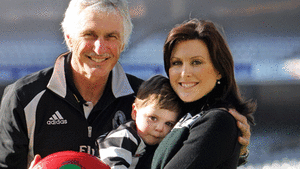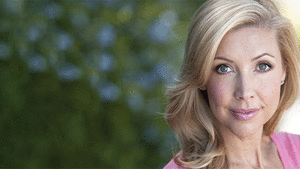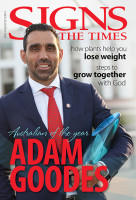Racism is a difficult subject to broach, perhaps even more so in Australia, because of the country’s blighted history with its Indigenous people. To speak of it suggests its continued presence and creates a knee-jerk reaction in many of those determined to defend the country’s past (or that it even existed), and who fail to recognise racism’s transformation from a simple differentiation of superior and inferior races into something more insidious and unrecognisable today.
And perhaps it’s a reason why the appointment of Aboriginal AFL player Adam Goodes as Australian of the Year for 2014 has attracted criticism.
Goodes, the National Australia Day Council says, “is a great role model and advocate for the fight against racism both on and off the [football] field.”
Conservative Herald Sun columnist Andrew Bolt on the other hand, argues Goodes’ stand against racism—past and present—is “vilify[ing] our past and preach[ing] division.”
Other less high-profile detractors suggest Goodes was named Australian of the Year simply for calling out a mere 13-year-old girl who had yelled a racial slur at him during a match at the MCG.
Few realise the role model that he is to others and perhaps more forget that after the incident last year, Goodes never pressed charges even when police invited him to, and he asked via social media that the community support her.
“I don’t put any blame on her. It’s not a witch-hunt, I don’t want people to go after this young girl,” he said the next day.
Taking The High Road
Racism, Goodes insists, can only be fought through education. “As minorities, we have to take the high road, in that we have to help educate the people who are saying the bad things toward us,” Goodes tells me in a phone conversation on a Wednesday morning. He sounds tired but friendly, and when the conversation turns to racism, a topic he admits to being passionate about, he is eloquent and determined.
“[Trying to educate others] doesn’t mean that it’s going to hurt less; it doesn’t mean that we’re going to feel good for doing that. It’s just what we have to do if we want to see change in the community. And it’s a big thing to get your head around, that ‘I actually have to help the people who are racially verbalising me, my people, my family.’ ”
Goodes is a “proud Adnyamathanha man,” born to a white father and an Aboriginal mother. His mother, Lisa May, along with eight of her siblings, was one of the so-called stolen generation.
“Being Aboriginal, I was faced with racism all my life; still am, to this day,” he says. Goodes was the only black kid in his school at one stage, but as a teenager, excelled in sport and so fortunately for him, “that point of difference seemed to overcome my other point of difference.”
![]() A Casual Attitude
A Casual Attitude
Goodes admits fighting racism is not only an uphill battle, it can also be a very different type of issue to combat. “Just when you think that it’s truly getting better, that it’s improving, something can just turn your world upside down again.”
He agrees with Collingwood footballer Harry O’Brien (now known as Heritier Lumumba, after choosing to revert to the name of his biological father) that Australia has a very casual attitude toward racism. “There’s no doubt in social environments the casualness that people have, making jokes to make each other laugh at the disadvantage of race, religion, sexuality and gender. And until people say otherwise, people will continue to use that language.”
For Goodes, racist remarks can often be made unknowingly, which makes education—and a kindly patience—a key factor in diminishing it. And it is in social environments that Goodes believes we are all able to make a difference, because “if we all had that mindset and we start to help educate other people who are saying the wrong thing, then we can make a change in the community."
“If it’s a family member, a friend, in a group of your friends or at school, you need to grab that person out of that situation, out of that group environment that you might be in, and have a little word with them: ‘Excuse me, what you said before was unacceptable. It hurt my feelings; it’s racist. Would you please not refer to me in that way again.’ ”
Over the years, Goodes admits to pulling friends and teammates aside to do just that, not because they were being deliberately offensive but were simply unaware of the hurt they were causing, because of the “casualness of racism.”
“When you have a relationship with people, and there’s respect between the two of you, they’ve always been open and willing to have that discussion,” he says. “It has been uncomfortable to have, but since having that conversation, they don’t refer to racist jokes in my presence. They don’t refer to Aboriginal people with certain words that they used to, so in my own environment, it is changing. So until people draw that line in the sand and say what is acceptable and what isn’t, people will just go about their business the way they are.”
Role Model
A player with the Sydney Swans, Goodes holds an elite place in AFL history as a dual Brownlow medallist (awarded to the “fairest and best” player and acknowledged as the highest individual honour in the sport) and a winner of two premierships. He is a four-time All-Australian, member of the Indigenous Team of the Century, and has represented Australia in the International Rules Series.
Goodes was named as a Qantas Ambassador in October 2013, working with the airline to help increase awareness among Qantas employees and customers of Indigenous issues and culture. Besides being a part of the Racism: It Stops With Me campaign, he is also a White Ribbon ambassador (the world’s largest male-led movement to end men’s violence against women) and is more recently working to raise awareness around the Recognise campaign, a movement to recognise Aboriginal and Torres Strait Islander peoples in the Australian Constitution. It is these three areas that he says he will focus on as Australian of the Year 2014.
Over the years, Goodes has also spent time working with troubled Indigenous youth, including those in youth detention centres. “It’s about having fun with them when you go see them, not talking about what they’ve done but what they want to do with their lives, and that they have to dream big and with hard work and sacrifice they can do anything in their lives,” he says. “It’s about instilling a bit of confidence in them—that they are better than where they are right now.”
Goodes takes his responsibility as mentor and role model seriously and tries to carry himself in a way in which people might look up to and wish to replicate. Of the qualities he wants people to see and imitate, he says, “I think the biggest thing is my discipline [and the need] to make sacrifices to be successful in my job. [Then there’s] my determination and hard work to stay at state level for such a long period of time and just my compassion for others and for everyone in the community to want something better.”
A Goodes Legacy
So when January 26, 2015 comes around, what will be his legacy as he metaphorically hands over the Australian of the Year mantle to someone else?
“I don’t think there will be a defining measure that I’ll be able to go, ‘Yup, I was a success.’ What happens in the next 20 years will be a true measure of not only my success, but the success of everyone in our community and that’s what we’re trying to do,” he says.
“The things that I’m passionate about [eradicating racism and domestic violence, and constitutional recognition of Indigenous Australians] are the things that not only I want, but what other people want changed in the community as well. If we all believe in it, and if we all start doing something about it, we’re going to see change.
“I don’t think it’s just going to be me who does it. I’ll be the one out there talking about it, setting good examples by it and bringing awareness around it but you really do need everybody else to believe in it and to follow as well.”
Where most would passionately fight one cause, Goodes is on a mission to fight three—and more—and all in the spirit of reconciliation, forgiveness, kindness and acceptance.
And perhaps that’s what the National Australia Day Council saw when they named him Australian of the Year.
The GO Foundation
In a big to make an even bigger impact on the lives of the Indigenous Australians, Goodes, together with his cousin and former teammate, Michael O' Loughlin, established the Goodes and O'Loughlin (GO) Foundation in 2009
Th GO Foundation exists to make a positive impact on the lives of Indigenous Australians, witha focus on self- empowerment, through education and employment.
Already, they have set up a community centry for the women and children on a small community in Dareton, a town in the far west of New South Wales, Australia. And in line with its mission, the GO Foundation is about to launch a scholarshop program starting with enabling boys and girls in the Sydney area to attend provate schools.
"We're really excited about [the scholarshop program] because it has taken some time to get to here," Goodes says. "Hopefully we'll start the to create the next batch of Ingigenous role models for the Sydney area. We hope to give these kids the same oppourtunities that Micahel and I have had during our lives, [to have] that support and compassion from those around us to help us succeed and be the best that we can possible can be."






